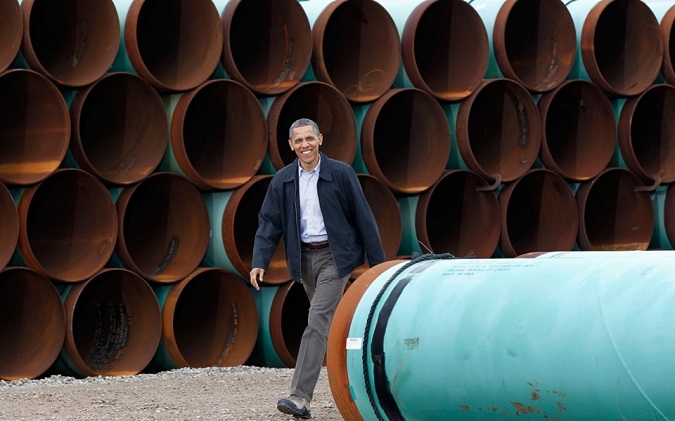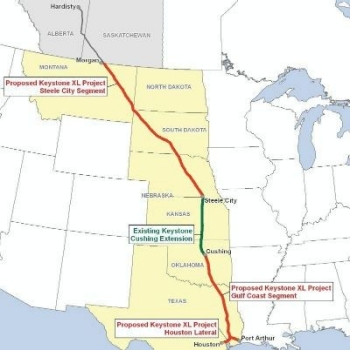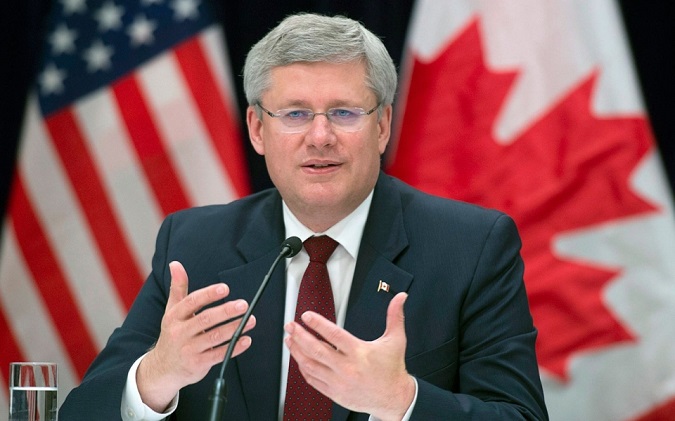Obama faces nagging dilemma over Keystone XL pipeline

As thorny diplomatic issues and budget battles at home occupied the White House last week, a series of reports were released that underscored another headache to come for the president: The Keystone XL pipeline.
Barack Obama faces a difficult choice over the controversial project, which would carry tar sands oil from Alberta province in western Canada to refineries in Texas: Approve and run the risk of outraging environmentalists, or say no and face the ire of a majority of Americans who appear to support the project.
Anti-Keystone XL activists have new ammunition from the two recent reports.
The Center for Biological Diversity published a study (PDF) Wednesday about the damage that the pipeline would cause to wildlife habitats it crosses. The organization has criticized the U.S. State Department, which is currently reviewing the cross-border oil proposal, for not considering the impact on endangered species.
On Friday, the United Nations-sponsored Intergovernmental Panel on Climate Change released its latest report on the potentially devastating impact of climate change, noting that it is “extremely likely” the cause of global warming is human carbon dioxide output from fossil fuels, including carbon-rich tar sands oil like that which the Keystone pipeline is designed to transport.
 Obama has said that he would only approve the project if it didn’t contribute to climate change. He’ll likely make his decision sometime in the first half of 2014.
Obama has said that he would only approve the project if it didn’t contribute to climate change. He’ll likely make his decision sometime in the first half of 2014.The project still has the backing of about two-thirds of the U.S. public, according to a report by the Pew Research Center for People and The Press, released Thursday.
But, by the same two-thirds margin, Americans also support tighter controls on power plant emissions, and express a growing skepticism over fracking – also known as hydrolic fracturing – another process for reaching oil and gas once thought too difficult or expensive to extract, according to Pew.
The research saw strong Republican backing for the Keystone XL pipeline, while Democrats appear more split on the issue, with 51% in favor.
People in states in the proposed path off the pipeline also tend to support the plan, with numbers similar to the overall population.
“In the six states the pipeline would traverse – Montana, South Dakota, Nebraska, Kansas, Oklahoma and Texas – 69% support its construction while 28% are opposed. Those in other states support it by a margin of 64% to 31%,” the Pew Study found.
‘No Brainer’
In a sign of how partisan the divide over the project has become, Republicans have included demands for the pipeline’s approval in recent congressional fights over the budget.
Advocates of Keystone XL say it will bring thousands of jobs and billions of dollars in tax revenue to the United States, serving as a source of fuel from one of America’s closest and friendliest allies, Canada.
A Cornell University study, however, disputes the job claims, saying most of the new positions will be temporary, with many workers coming from out of state. It would also divert the diesel fuel already being pumped to refineries in the Midwest, increasing fuel costs there.
“Job estimates put forward by TransCanada are unsubstantiated and the project will not only create fewer jobs than industry states, but that the project could actually kill more jobs than it creates,” the study found.
There’s also the risk of a pipeline spill, such as one that happened in Michigan in 2010.
Some wealthy opponents to the project have delved into deep pockets to back their calls to stop the pipeline from becoming a reality.
Billionaire investor Tom Steyer, an Obama donor, has funded advertising saying that the oil would bypass the U.S. and flow to other countries, a view supported by pipeline opponents at the Natural Research Defense Council (NRDC).
As one of the top contributors to Democrats, Steyer’s voice carries weight in Washington.
But his view is countered by industry representatives. In mid-September, Jack Gerard, president of the American Petroleum Institute, an oil and gas industry trade group, marked the five-year anniversary of the pipeline’s application with frustration.
“An anniversary of delay is not a call for celebration. Five years of review for a project that is in this nation’s best interest is unacceptable. Refining more Canadian oil at American refineries should be a ‘no brainer.’ It will help displace oil from unstable parts of the world and enhance our national security.” Gerard said, according to Oil and Gas Journal, referring to U.S. oil imports from the Middle East.
Trade unions and the U.S. Chamber of Commerce, a nationwide business lobby, support the plan.
Chamber of Commerce representative Karen A Harbert said opposition and regulations reflect a “BANANA mentality,” or ‘Build Absolutely Nothing Anywhere Near Anything.’
‘Don’t take no for an answer’

Canada’s prime minister Stephen Harper vowed Thursday to persevere in putting the pipeline in place, as TransCanada, a Canadian company, would build and operate Keystone XL.
“My view is that you don’t take no for an answer,” Harper told the Canadian American Business Council.
“We haven’t had that but if we were to get that, that won’t be final. This won’t be final until it’s approved and we will keep pushing forward,” Harper said, according to CBC News.
Harper, a member of Canada’s Conservative party, also contends that Keystone XL would create 40,000 jobs in the U.S.
But President Obama doesn’t agree.
In a July interview with The New York Times, Obama expressed skepticism about how much the pipeline could help create jobs, or whether it would even serve to bring more fuel to the U.S.
“Republicans have said that this would be a big jobs generator. There is no evidence that that’s true,” Obama told the Times, saying only a few thousand workers would be necessary to build the pipeline, and then only a few dozen would maintain and operate it.
While granting that it might be nice to have an energy rich ally to the north, Obama said he didn’t think everyday Americans would see much benefit.
“That oil is going to be piped down to the Gulf to be sold on the world oil markets, so it does not bring down gas prices here in the United States,” the president said.
In June, Obama set regulations making CO2-producing industries curb their emissions, and has said that he’d only greenlight Keystone XL if it doesn’t exacerbate the effects of climate change.
But even without Obama’s blessing, the oil in the tar sands, which Alberta says rivals Saudi Arabia’s, could still find its way to market by rail, according to the Wall Street Journal.
‘All risk and no reward’
Right now, both sides of the debate appear to be in a holding pattern on the issue as the State Department drafts its final report on the matter, followed by three months of public comment on the study. After that, the president can make his decision.
Danielle Droitsch, director of the Canada Project at NRDC, said the earliest a decision could come would be the first few months of 2014, assuming the State Department releases its report soon.
She said the pipeline poses a significant risk of harming the climate and threatens to spill heavy, dirty tar sands oil into a huge natural water reservoir, the Ogallala aquifer, which runs just underneath the high plains and is key for farmers and ranchers in the region.
“The pipeline is going to be buried right into the aquifer,” Droitsch told Al Jazeera. “They’re basically using the United States as a pathway. It’s all risk and no reward.”
If Obama does approve the pipeline, it will face legal challenges in court, Jane Kleeb, an anti-Keystone XL activist in Nebraska, told Al Jazeera, and will serve as a betrayal of his supporters in the environmental movement.
“I think the president will be caving in to the Republican Party, which hates him, and big oil who writes big checks to anyone who runs against him or his party, and I also think he will be betraying his own daughters’ future,” said Kleeb, executive director of Bold Nebraska, a progressive advocacy group.
Three Nebraska farmers are suing over the pipeline’s proposed route over their land, which they say was drawn up unfairly.
“The landowners don’t think they should have to be forced to put an export pipeline on land that’s been in their family for generations,” Kleeb said.
“This is America, right?”
You can return to the main Market News page, or press the Back button on your browser.

